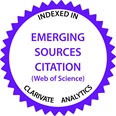Tytuł
Odporność w kryzysie: badanie longitudinalne reakcji przedsiębiorców na pandemię COVID-19
Keywords
resilience, pandemic, entrepreneurial businesses, longitudinal study
Abstract
Purpose: The purpose of this paper is to explore what factors contribute to entrepreneurial resilience by analysing the challenges that Chinese entrepreneurs in China and Poland encountered during the pandemic, their coping plans, and the adjustments they made.
Methodology/Approach: The paper adopts a two-year longitudinal research methodology with two rounds of in-depth interviews to observe the immediate challenges faced by entrepreneurs and their responses at the beginning of 2021 on the one hand, and to follow up on their adjustments and the state of their businesses in 2023 on the other hand, in order to shed light on the long duration and complexity of the pandemic›s impact on entrepreneurs. Semi-structured interviews were conducted with two Chinese entrepreneurs to capture evolving dynamics. Data analysis emphasises thematic coding and content analysis to identify the dimensions influencing entrepreneurs’ resilience and adaptability in the post-COVID-19 era.
Findings: In the 2021 interviews, entrepreneurs demonstrated three key competencies: utilising network resources, rapid responding, and innovating. By the 2023 follow-up interviews, we found that entrepreneurs’ hardiness and flexible adjustment became essential to their resilience. These five dimensions represent entrepreneurs’ complexity and multidimensional resilience in a crisis.
Limitations: The research based on a limited dataset consisting of only two companies, which may not be representative of the broader business landscape. Additionally, there may be a degree of subjectivity in interpreting the data, and some details are lacking, such as specific financial figures. To enhance the depth and breadth of our findings, future research should aim for a larger and more diverse sample, access to more comprehensive data, and a more extended time frame.
Abstrakt
Cel: celem niniejszego artykułu jest zbadanie, jakie czynniki wpływają na odporność przedsiębiorczości, poprzez analizę wyzwań, przed którymi stanęli chińscy przedsiębiorcy w Chinach i Polsce podczas pandemii, oraz planów radzenia sobie i dokonanych przez nich dostosowań.
Projekt/metodologia/podejście: w artykule przyjęto dwuletnią metodologię badań longitudinalnych z dwiema rundami wywiadów pogłębionych. Aby wyjaśnić długi czas trwania i złożoność wpływu pandemii na przedsiębiorców, z jednej strony obserwowano bezpośrednie wyzwania stojące przed przedsiębiorcami i ich reakcje na początku 2021 r., z drugiej zaś – śledzono ich dostosowania i stan ich firm w 2023 roku. Przeprowadzono częściowo ustrukturyzowane wywiady z dwoma chińskimi przedsiębiorcami, aby uchwycić zmieniającą się dynamikę. Analiza danych kładzie nacisk na kodowanie tematyczne i analizę treści w celu zidentyfikowania wymiarów wpływających na odporność i zdolność adaptacyjną przedsiębiorców w erze po COVID-19.
Wnioski: w wywiadach przeprowadzonych w 2021 r. przedsiębiorcy wykazali się trzema kluczowymi kompetencjami: wykorzystywaniem zasobów sieciowych, szybkim reagowaniem i innowacyjnością. W wywiadach uzupełniających z 2023 r. stwierdzono, że odporność przedsiębiorców i elastyczne dostosowanie stały się niezbędne dla ich odporności. Te pięć wymiarów reprezentuje złożoność i wielowymiarową odporność przedsiębiorców w kryzysie.
Ograniczenia: badanie opiera się na ograniczonym zbiorze danych składającym się tylko z dwóch firm, które mogą nie być reprezentatywne dla szerszego środowiska biznesowego. Ponadto, interpretacja danych może być w pewnym stopniu subiektywna, a niektóre szczegóły, takie jak konkretne dane finansowe, nie są dostępne. Aby zwiększyć głębię i zakres naszych ustaleń, przyszłe badania powinny mieć na celu większą i bardziej zróżnicowaną próbę, dostęp do bardziej kompleksowych danych i dłuższe ramy czasowe.
Acknowledgments
Funding
This research received no funds.
Declaration of Conflicting Interests
The authors declare that there is no conflict of interest related to the research paper. The study was conducted without any financial or personal relationships that could be perceived as potentially influencing the research or its outcomes.
Declaration about the scope of AI utilisation
The authors used the AI tool ChatGPT to help check grammar (only) in the preparation of this article.
Recommended Citation
Zhang, Y., & Bu, X. (2024). Resilience in Crisis: A Longitudinal Study of Entrepreneurial Responses to COVID-19 pandemic. European Management Studies, 22(3), 49-70. https://doi.org/10.7172/2956-7602.105.3
First Page
49
Last Page
70
Page Count
22
Received Date
18.12.2023
Accepted Date
25.11.2024
Online Available Date
10.12.2024
DOI
10.7172/2956-7602.105.3
JEL Code
H12, H75, H84, L38
Publisher
University of Warsaw







